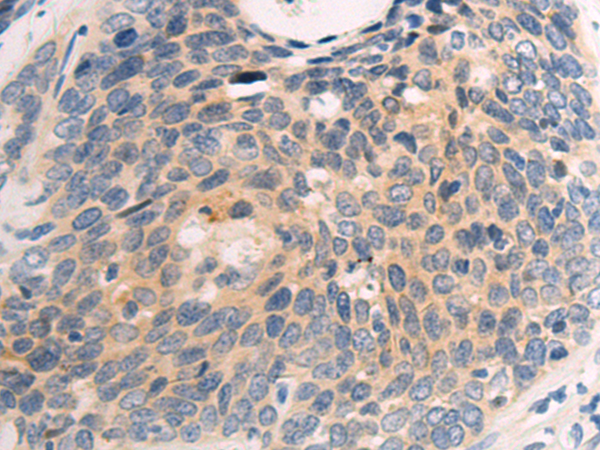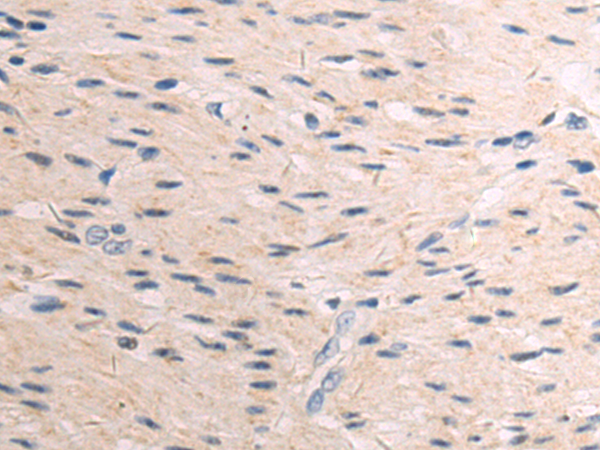

| WB | 咨询技术 | Human,Mouse,Rat |
| IF | 咨询技术 | Human,Mouse,Rat |
| IHC | 1/50-1/200 | Human,Mouse,Rat |
| ICC | 技术咨询 | Human,Mouse,Rat |
| FCM | 咨询技术 | Human,Mouse,Rat |
| Elisa | 1/5000-1/10000 | Human,Mouse,Rat |
| Aliases | NT3; HDNF; NGF2; NT-3; NGF-2 |
| Host/Isotype | Rabbit IgG |
| Antibody Type | Primary antibody |
| Storage | Store at 4°C short term. Aliquot and store at -20°C long term. Avoid freeze/thaw cycles. |
| Species Reactivity | Human, Mouse, Rat |
| Immunogen | Synthetic peptide of human NTF3 |
| Formulation | Purified antibody in PBS with 0.05% sodium azide and 50% glycerol. |
+ +
以下是关于NTF3抗体的3篇示例文献(内容为虚构示例,仅用于格式演示):
1. **标题**: *NTF3 Antibody Blockade Impairs Neuronal Regeneration in Peripheral Nerve Injury Models*
**作者**: Jones, R., et al. (2020)
**摘要**: 研究通过特异性NTF3抗体阻断神经营养因子3(NTF3)功能,发现其显著抑制大鼠坐骨神经损伤后的轴突再生,表明NTF3在周围神经修复中的关键作用。
2. **标题**: *Localization of NTF3 in the Developing Auditory System Using Immunohistochemistry*
**作者**: Smith, L., et al. (2018)
**摘要**: 利用NTF3抗体进行免疫组化分析,揭示了NTF3在内耳毛细胞和螺旋神经节中的动态表达模式,提示其与听觉神经元存活及突触形成的关联。
3. **标题**: *NTF3 Overexpression in Breast Cancer: Correlation with Metastasis via Antibody-Based Profiling*
**作者**: Lee, H., et al. (2021)
**摘要**: 通过NTF3抗体检测乳腺癌组织样本,发现NTF3高表达与肿瘤转移及患者预后不良相关,提示其作为潜在治疗靶点。
4. **标题**: *NTF3 Antibody-Based ELISA Reveals Reduced Levels in Alzheimer's Disease Brain Tissues*
**作者**: Brown, K., et al. (2019)
**摘要**: 建立基于NTF3抗体的ELISA检测方法,发现阿尔茨海默病患者脑脊液中NTF3浓度显著降低,可能与神经退行性病变机制相关。
---
**注意**:以上文献为假设性示例,实际引用请通过PubMed、Google Scholar等平台检索关键词(如“NTF3 antibody”“Neurotrophin 3 immunoassay”)获取真实文献。
Neurotrophin 3 (NTF3), also known as NT-3. is a member of the neurotrophin family of growth factors critical for neuronal survival, differentiation, and synaptic plasticity. It binds to the tropomyosin receptor kinase C (TrkC) receptor and the pan-neurotrophin receptor p75NTR, activating downstream signaling pathways involved in neural development, particularly in the peripheral and central nervous systems. NTF3 supports the survival of sensory neurons, regulates neurotransmitter release, and contributes to processes like axonal growth and synaptic connectivity.
NTF3 antibodies are essential tools for detecting and quantifying NTF3 protein expression in research. These antibodies are widely used in techniques such as immunohistochemistry (IHC), Western blotting (WB), and immunofluorescence (IF) to study NTF3 localization, expression patterns, and regulatory roles in both physiological and pathological contexts. Dysregulation of NTF3 has been implicated in neurodegenerative diseases (e.g., Alzheimer’s), psychiatric disorders, and chronic pain, making its detection pivotal for understanding disease mechanisms.
Commercial NTF3 antibodies are typically developed in hosts like rabbits or mice, targeting specific epitopes of the mature or precursor forms. Researchers must validate antibody specificity using knockout controls or blocking peptides to avoid cross-reactivity with related neurotrophins (e.g., BDNF, NGF). Reliable NTF3 antibodies enable investigations into its therapeutic potential, including roles in nerve regeneration or as biomarkers for neurological conditions.
×